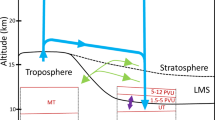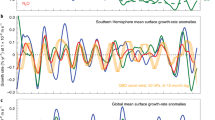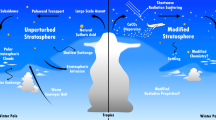Abstract
Air samples, collected cryogenically at different heights of the stratosphere, were analysed for carbon dioxide with an IR absorption technique. Supplementary tropospheric air samples were taken aboard commercial airliners. The results reported here show that the CO2 mixing ratio is not constant with altitude but rather decreases in the stratosphere, by about 7 p.p.m.v., between the tropopause and 33 km. One conclusion is that recently increased concentrations of CO2 in the troposphere have not propagated far into the stratosphere.
This is a preview of subscription content, access via your institution
Access options
Subscribe to this journal
Receive 51 print issues and online access
$199.00 per year
only $3.90 per issue
Buy this article
- Purchase on Springer Link
- Instant access to full article PDF
Prices may be subject to local taxes which are calculated during checkout
Similar content being viewed by others
References
Fabian, P. et al. J. geophys. Res. 84, 3149–3154 (1979).
Bischof, W. Tellus 29, 435–444 (1977).
Volz, A. et al. WMO Technical Conf. on Regional and Global Observation of Atmospheric Pollution Relative to Climate, Boulder, 171–179 (WMO-no. 549, 1979).
Author information
Authors and Affiliations
Rights and permissions
About this article
Cite this article
Bischof, W., Fabian, P. & Borchers, R. Decrease in CO2 mixing ratio observed in the stratosphere. Nature 288, 347–348 (1980). https://doi.org/10.1038/288347a0
Received:
Accepted:
Issue Date:
DOI: https://doi.org/10.1038/288347a0
This article is cited by
-
Seasonal Variation of CO2 Vertical Distribution in the Atmospheric Boundary Layer and Impact of Meteorological Parameters
International Journal of Environmental Research (2017)
-
Increased concentration and vertical distribution of carbon dioxide in the stratosphere
Nature (1985)
Comments
By submitting a comment you agree to abide by our Terms and Community Guidelines. If you find something abusive or that does not comply with our terms or guidelines please flag it as inappropriate.



